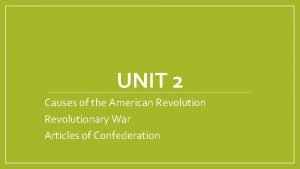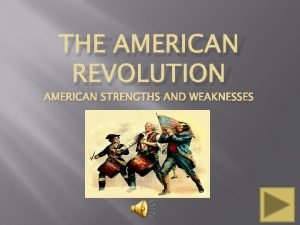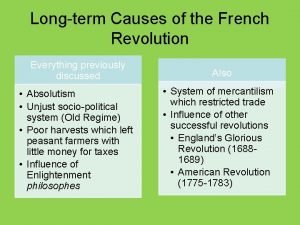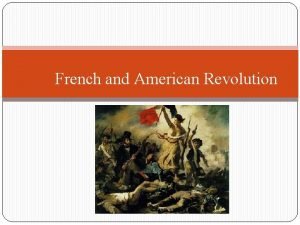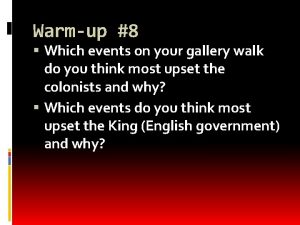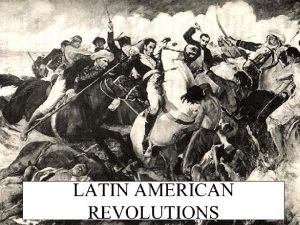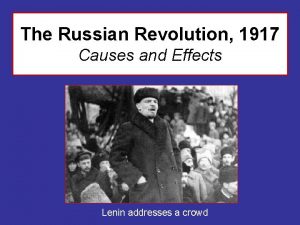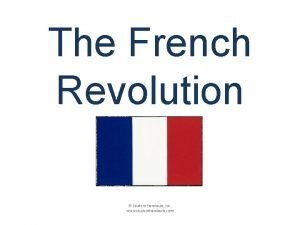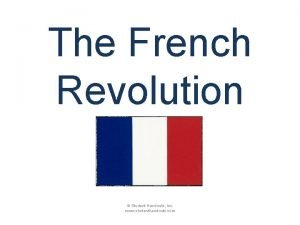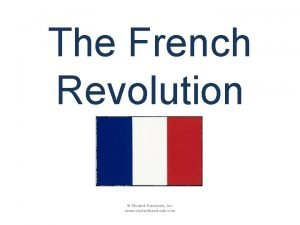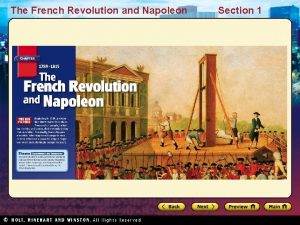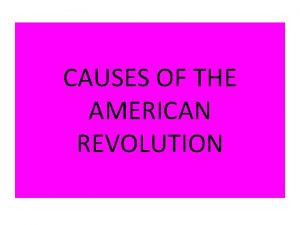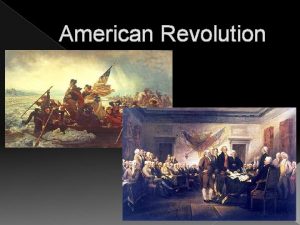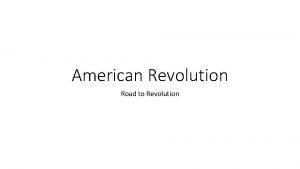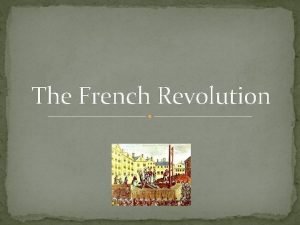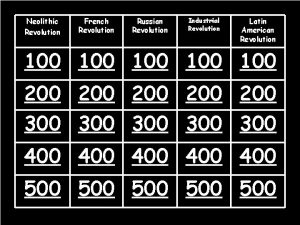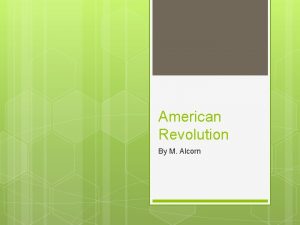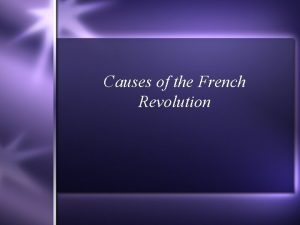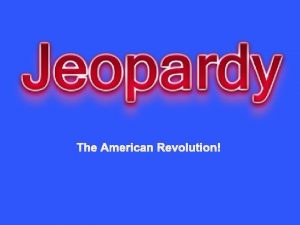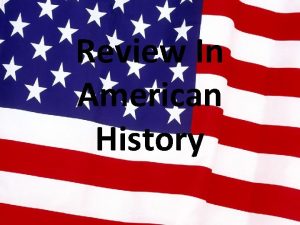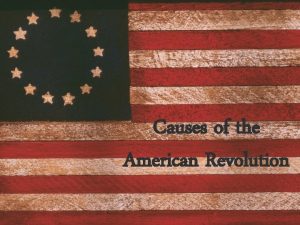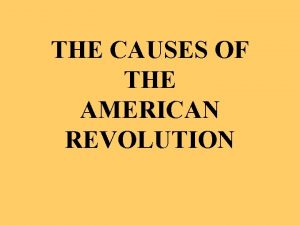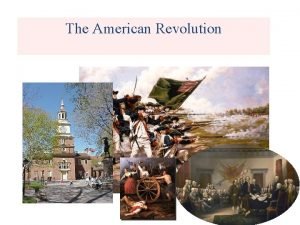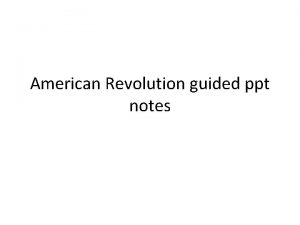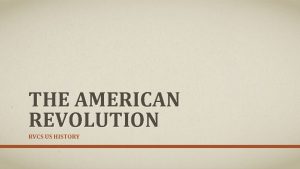Causes of the American Revolution Self Government in





















- Slides: 21

Causes of the American Revolution & Self Government in the Colonies

1660 Navigation Acts British Action: v. They were designed to keep trade in England support mercantilism. v. Colonists could only trade goods with England. v. All colonial ships must stop in a British harbor before going to another country. Colonial Response: v. They ignored them (It was profitable to trade with other countries) v. Salutary (healthy) Neglect (The British did not insist on the strict enforcement of laws, and relaxed enforcement came with continued loyalty)

Taxation without Representation v. A slogan that originated during the 1750 -1760 s that expressed a primary grievance of the American colonists. v. Colonists believed that because they were not directly represented within the British Parliament, any law that affected them were illegal under the Bill of Rights of 1689. v. This denied their rights as Englishmen. v. This was a major cause of the American Revolution.


French & Indian War (Seven Year’s War) v 1754 -1763 v. England, with the help of the colonists and Iroquois Indians, defeated France and took control of French territories (Canada and east of the Mississippi River) v. The war cost England A LOT OF MONEY!!! v. They had to buy weapons, ammunition, and supplies. v. At the end of the war, England was in A LOT OF DEBT!!! v. Citizens then suffered heavy taxes.

Treaty Paris: Proclamation Line of 1763 v. Britain claimed land east of the Mississippi River v. Proclamation Line: v. Banned all settlement west of the Appalachian Mountains (This was to ease tensions with the Native Americans) v. This increased the Independent Spirit.

Britain’s New Policy for Colonial America v. This New Policy had three basic objectives: v. It placed the colonies under strict British political and economic control. v. It made the colonies respect and obey British laws. v. It made the colonies pay their part in maintaining the British Empire.

Molasses Act of 1733 v This was an act from Parliament that imposed a tax of six pence per gallon on molasses when it came from places other than those colonized by the British. v The purpose was to protect the sugar plantations the British had in the West Indies. v This act prevented colonists from trading with the French and the Dutch. It required that they get sugar, molasses, and rum ONLY from the British. v This was repealed by the Sugar Act of 1764.

Sugar Act of 1764 AKA The American Revenue Act of 1764 Why? The Molasses Act didn’t really stop anything – SHOCKER v British Action v. Colonial Response v. It was designed to curb the smuggling v. This was the first time a tax had of sugar and molasses from places not been passed to raise revenue colonized by the British. rather than to regulate trade. v. It cut the tax on molasses but raised it v. Colonial merchants protested on other goods such as textiles, wine, the increased duties. coffee, indigo, and sugar.

Quartering Act of 1765 v. British Action: v. The purpose was to keep troops in the colonies and to reduce the cost. v. Colonists had to keep troops in their homes. v. Colonial Response: v. Colonists did not get along with the army and did not want them there permanently.

Stamp Act of 1765 v. Colonial Response: v. British Action: v. Created the Sons of Liberty v. Required colonists to pay a tax on every v. They harassed the stamp piece of paper they used. This included distributors. documents, newspapers, and even v. They boycotted (a collective refusal playing cards by forcing colonists to to use, buy, or deal with) English place a special stamp on the items. goods. v. The money collected was used to help pay the costs of defending and protecting the American frontier near the Appalachian Mountains.

Stamp Act: The British Respond v. Parliament repealed the Stamp Act v. Declaratory Act: Asserted Parliament’s right to make laws that “bind the colonies in all cases whatsoever”.

Townshend Acts of 1767 v. Colonial Response: v. British Action: v. They organized a new boycott on v. They put a tax on goods. such as paper, glass, paint, v. They protested with “No Taxation and tea. Without Representation” v. The revenue raised would v. There were clashes between be to pay the salaries of colonists and soldiers. British officials in the v. Women got involved in the protests. colonies.

Writs of Assistance v British Action: v. Designed to crack down on colonial smuggling. v. Writs of Assistance were documents that served as search warrants, allowing British officials to search any ship or building that they suspected could contain smuggled goods. v. Colonial Response: v. Boston merchants were outraged v(Massachusetts governor authorized this)

March 5, 1770: The Boston Massacre v 5 civilians died as a result; 3 died on the scene and 2 died later: Crispus Attucks, Samuel Gray, James Caldwell, Samuel Maverick, and Patrick Carr. v. All victims of the Massacre were buried at Granary Burying Ground in Boston. v. Captain Thomas Preston and eight of his men were arrested for manslaughter – all were later acquitted. v. This is considered to be the “Spark” of the American Revolution.

The Committees of Correspondence, 1772 v. Started by Samuel Adams. v. They were provisional Patriot emergency governments throughout the 13 colonies. v. They were secret organizations used to pass information between the colonies. v. The most influential of the committees were located in the colonies of Massachusetts, New York, Pennsylvania, Delaware, Maryland, Virginia, and North Carolina.

Tea Act of 1773 v. The British Parliament repealed the Townshend Acts except for the tax on tea. v. This allowed the British East India Tea Company to become a monopoly on tea sales within the American colonies. v. The catalyst to the Boston Tea Party.

Boston Tea Party: Dec. 16, 1773 v. Samuel Adams and the Sons of Liberty boarded 3 ships in the Boston Harbor and threw 342 chests of tea overboard.

Intolerable/Coercive Acts of 1774 v. They were designed to punish the colonists for the Boston Tea Party. v. The British closed the port at Boston. v. Town meetings were banned in Massachusetts, and Boston was under military rule. v. Their attempt to isolate Massachusetts only strengthened the unity between the colonies.

First Continental Congress v September 05, 1774 v It was made up of delegates from the colonies, and all were represented except for Georgia. v They met in Carpenter’s Hall in Philadelphia, which was also the seat of the Pennsylvania Congress. v They were divided on the issue of declaring independence. v They sent the Declaration of Rights and Grievances to King George III. v. This defended the colonies’ right to run their own affairs. v. It also supported the protests in Massachusetts.

April 19, 1775 v. The “Shot Heard Round the World” was fired at the Battle of Lexington and Concord. v. This was the start of the Revolutionary War.
 Causes of the american revolutionary war
Causes of the american revolutionary war American revolution strengths and weaknesses
American revolution strengths and weaknesses Long term causes french revolution
Long term causes french revolution Effect of the american revolution
Effect of the american revolution Causes of the american revolution gallery walk
Causes of the american revolution gallery walk Latin revolution causes
Latin revolution causes Economic causes of french revolution
Economic causes of french revolution Real and ideal selves
Real and ideal selves Proximate causes vs ultimate causes
Proximate causes vs ultimate causes Proximate causation vs ultimate causation
Proximate causation vs ultimate causation What causes seasons rotation or revolution
What causes seasons rotation or revolution Causes and effects of the russian revolution
Causes and effects of the russian revolution Causes and effects of the french revolution
Causes and effects of the french revolution Explain the causes of french revolution
Explain the causes of french revolution Short term causes of the french revolution
Short term causes of the french revolution Short term causes of the french revolution
Short term causes of the french revolution Immediate cause of french revolution
Immediate cause of french revolution The french revolution political causes
The french revolution political causes French revolution causes
French revolution causes French revolution
French revolution Storming of the bastille cartoon
Storming of the bastille cartoon Haitian revolution causes
Haitian revolution causes
